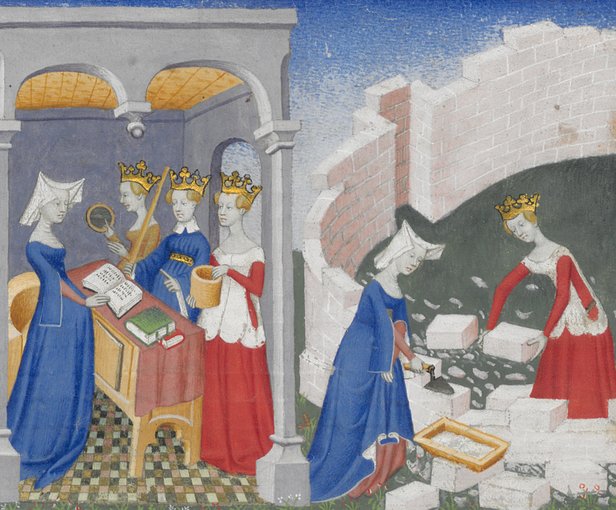Christine de Pizan is one of the few women who had prominence as a secular writer during a time when women were neither educated nor independent. If a woman was literate, she participated in a religious order either as a nun, anchoress, or Beguine.
Christine was born in Venice to parents who had both been educated at Bologna. When she was five her family moved to France so that her father, Tommaso di Benvenuto da Pizzano, a physician and astrologer, could work as a councilor to King Charles V.
In Paris they changed their name to the French, Pizan. Her mother wanted her to learn domestic skills but her father believed that it would benefit her to learn how to read and write. In the milieu of a court that had an immense library, she learned Italian, French, and some Latin.
  |
When she was 15 years old, she married Étienne du Castel, a nobleman and courtier who became the king’s secretary. But that same year Charles V died and her father lost his position, and with it the high income. Her father died in 1387 and three years later her husband died, leaving her with the burden of three small children.
Instead of remarrying, she decided to enlarge upon her studies. Fortunately she was allowed access to the libraries of the courts. In 1394 she began to write and sell her poems and receive commissions by patrons of the court.
Since she worked where manuscripts were prepared, her contacts were through the court of the duke Louis d’Orléans. She embarked on a quest to learn both literary and practical matters, enough to protect herself financially from predatory creditors.
Her widowed mother, also dependent on her, cared for her children while she threw herself into literature, philosophy, and anything she could learn. In 1397 her daughter, Marie, went to the Abbey of Poissy to live as a companion to the daughter of Charles VI.
In 1402 she wrote The Tale of the Rose, a poem that challenged the negative attitudes toward women in a book with a similar title, The Romance of the Rose.
As Christine continued to write poetry and prose, a feminist voice emerged. In Epistle to the God of Love (Epistre au dieu d’Amours), she rebutted the traditional negative beliefs and ideas about women by writing that the evils attributed to women were a product of men’s minds, not reality.
 |
| City of Ladies |
In The Book of the City of Ladies (Livre de la cité des dames)(1404) she created a utopian world where women had power and control and proved by logic that many of the negative myths regarding the female sex were false.
Its sequel, The Treasure of the City of Ladies, was different, written specifically for upper-class women and members of the court, to give them advice on managing their homes during their husbands’ absences. In this book she cautioned against dishonest governors and protecting one’s rights as a landowner so that unscrupulous agents would not take advantage of a woman’s status.
She was knowledgeable in farming and spoke to the role of women as housekeepers in a time when their domain included fields, crops, laborers, and maids. She gave advice on the psychology of hiring people to work in the vineyards. She stressed self-discipline in managing the laborers by rising as early as they did and watching how they worked.
   |
“The good housekeeper must keep her eyes wide open.” Christine was well acquainted with the chores involved in livestock maintenance, as well as agriculture. Every detail of the work involved in a responsible woman’s life was spelled out. The animals on the farm required maids to milk them and care for the milk.
Those women also took care of the kitchen, preparing meals for the other help, cleaning and weeding the garden, gathering herbs, and cooking for the other workers. She stressed that the mistress of a domestic enterprise should constantly be watchful.
At about the same time Philip the Bold, duke of Burgundy, asked her to write the official posthumous biography of Charles V. On November 30, 1404, she finished the work, which was entitled Le livre des fais et bonners meurs du sage roy Charles V.
Between the writing of his biography and 1415, she wrote on a variety of subjects, including warfare and the military. In 1410, she wrote Lamentations on the Civil War, and in 1413, the Book of Peace, imploring the people to forget war and bond in friendship.
The Battle of Agincourt (1415) was particularly devastating and probably influenced her decision to enter a nunnery. One of her last efforts was a writing inspired by the heroic deeds of Joan of Arc. In 1418 she entered a Dominican convent at Poissy and spent the rest of her life there, continuing to write.
